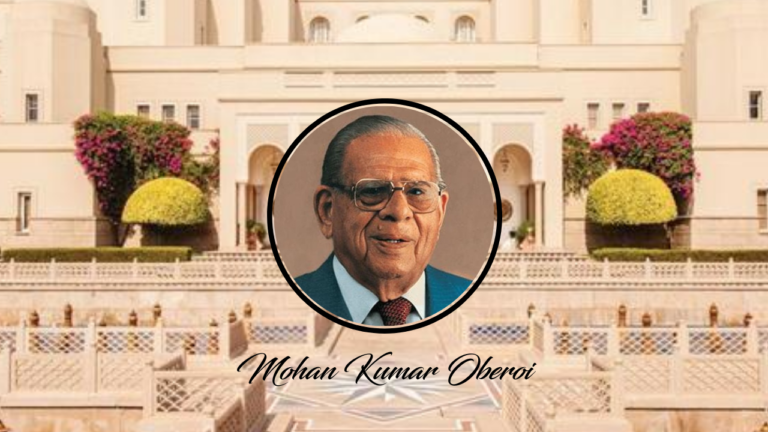The Inspiring Journey of Mohan Singh Oberoi: From Humble Beginnings to Hotel Empire
The story of Mohan Singh Oberoi is one of resilience, innovation, and an unwavering spirit. Born in 1898 in the Punjab province of undivided India, his journey from a humble clerk to the founder of one of the most luxurious hotel chains in India is nothing short of inspiring. This blog delves into the life of Mohan Singh Oberoi, highlighting the challenges he faced and the remarkable achievements he accomplished in the hospitality industry.

Early Life and Challenges
Mohan Singh Oberoi faced adversity from a young age. Losing his father to an epidemic when he was just six months old, he was raised by his mother, who prioritized his education despite their limited resources. At sixteen, Mohan moved to Lahore for college, where he not only learned English but also began working part-time in a shoe factory. This experience taught him valuable skills in management and production.
However, his life took a dramatic turn when the Rowlatt Act protests led to widespread unrest, causing many businesses, including the shoe factory, to shut down. Just as he was starting a family, Mohan found himself unemployed and desperate for work. He made the bold decision to move to Shimla, a city that would change his life forever.
The Turning Point: A Job at the Cecil Hotel
Upon arriving in Shimla, Mohan faced rejection in his first job interview. Determined, he stood outside the prestigious Cecil Hotel, waiting for an opportunity. When he finally approached the hotel manager, his impressive command of English won him a position as a clerk with a modest salary of fifty rupees per month. His responsibilities included managing coal supplies, where he quickly identified ways to save the hotel money through innovative solutions.
His hard work and keen observations soon led to a promotion to Guest Clerk. Mohan’s ability to interact with VIP guests and his growing understanding of hotel operations set the stage for his future success. By 1925, he had developed expertise in dealing with high-profile clientele and was ready for the next challenge.
Becoming a Hotelier: The Clarkes Hotel
After gaining valuable experience at the Cecil Hotel, the manager offered Mohan a partnership in the Clarkes Hotel, which he accepted. Mohan took on the responsibility of transforming the hotel, focusing on quality service and a welcoming atmosphere. His efforts paid off as the occupancy rates soared, reaching eighty percent.
However, when the manager fell ill and decided to sell the hotel, Mohan faced a daunting challenge. Lacking sufficient funds, his wife Ishran sold her jewelry to help secure the purchase, and Mohan took out a high-interest loan. With determination and hard work, he not only repaid the loan within two years but also established Clarkes Hotel as a prominent destination.
Expansion and the Grand Hotel
With his success at Clarkes Hotel, Mohan set his sights on bigger aspirations. He learned of the Grand Hotel in Calcutta, a prestigious property that had fallen into disrepair. Despite the risks, he chose to lease the hotel, recognizing the potential for transformation.
Upon taking over, Mohan faced immediate challenges, including a damaged reputation following a typhoid outbreak. Undeterred, he implemented a comprehensive renovation, modernized the plumbing, and ensured the highest hygiene standards. His efforts revitalized the Grand Hotel, and it soon regained its status as a premier destination.
World War II and Resilience
Just as the Grand Hotel was flourishing, World War II presented a new challenge. The British requisitioned the hotel to accommodate soldiers, threatening Mohan’s financial stability. Instead of succumbing to despair, he negotiated with military officials, offering to manage accommodations and meals for soldiers at a lower cost. This strategic move turned the Grand Hotel into a profitable venture during the war, generating significant revenue.
The Path to Becoming a Hotel Empire
After the war, Mohan’s ambition grew even larger. He aimed to acquire the Associated Hotels of India (AHI), which owned several luxurious properties across India. Through strategic investments and diligent efforts, he gained control of AHI, which included the very Cecil Hotel where his journey began.
With a vision to elevate his hotels to international standards, Mohan embarked on a world tour to study the best practices in hospitality. His experiences led to significant improvements in the design and operations of his hotels, setting new benchmarks in luxury service.
Innovative Strategies and Challenges
As the Oberoi Group expanded, it faced new competitors, notably the Taj Hotel Group. Mohan recognized the need to innovate continuously. He focused on creating unique experiences, such as transforming historical palaces into luxurious hotels, which set the Oberoi brand apart.
In the 1970s, he launched the Oberoi Hotel at Nariman Point in Mumbai, which became one of the tallest buildings in the city. Despite financial pressures and political instability, Mohan’s innovative strategies, including catering to Arab tourists during a civil war in Lebanon, solidified Oberoi’s reputation in the luxury hotel industry.
Legacy and Impact
Today, the Oberoi Group stands as a testament to Mohan Singh Oberoi’s vision and determination. With over thirty luxury hotels across the globe, the brand is synonymous with excellence in hospitality. Mohan’s story is not just about building a hotel empire; it is about resilience, innovation, and a relentless pursuit of quality.
His journey from a hotel clerk to the founder of one of the most respected hotel chains in the world serves as an inspiration for aspiring entrepreneurs everywhere. Mohan Singh Oberoi’s legacy continues to thrive, reminding us that with hard work and determination, one can rise from humble beginnings to achieve greatness.
Conclusion
The life of Mohan Singh Oberoi is a remarkable tale of overcoming adversity and achieving dreams. His dedication to excellence and commitment to quality service have left an indelible mark on the hospitality industry. As we reflect on his journey, we are reminded that success is not solely about wealth but about the impact one leaves on the world.
